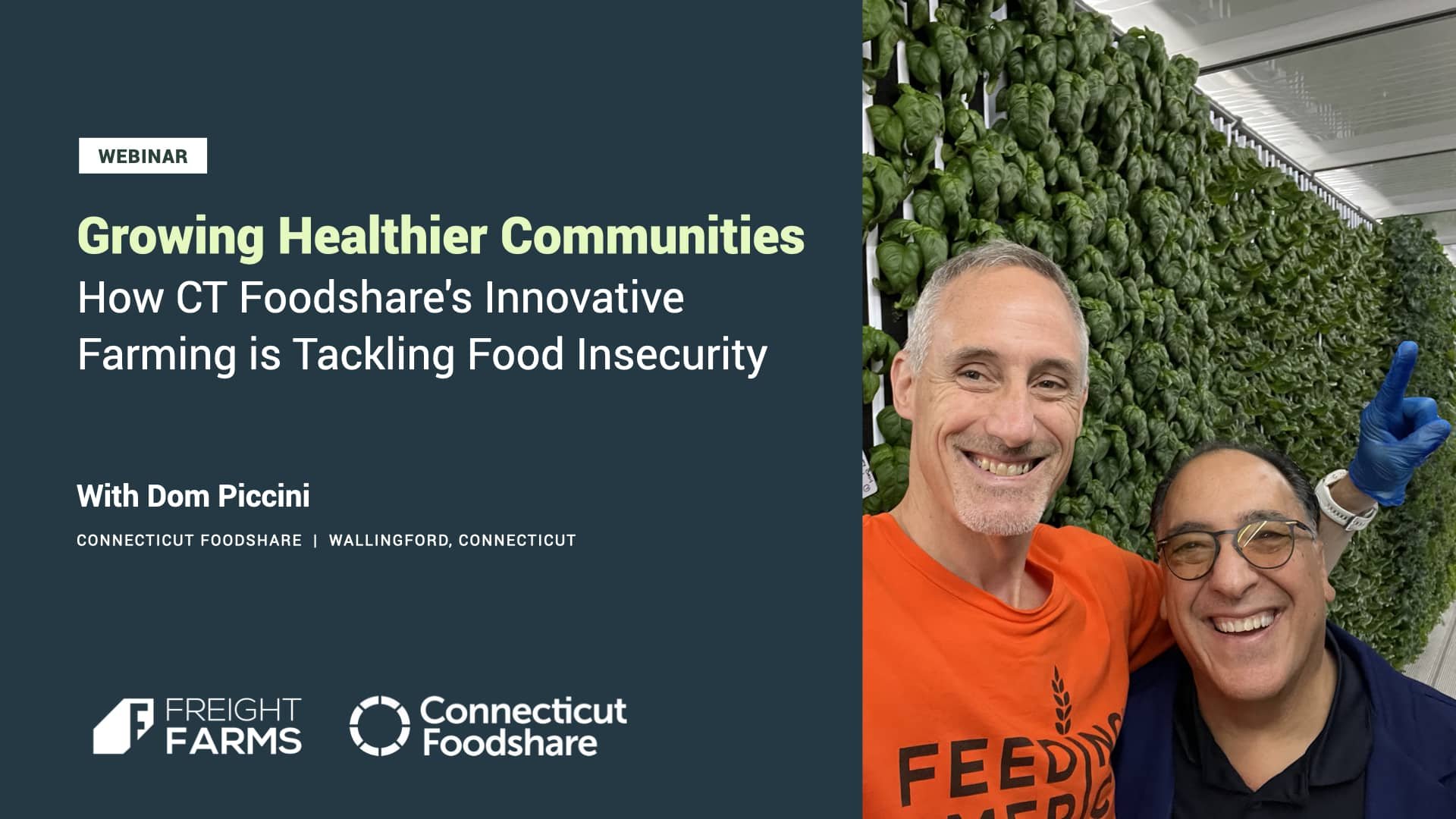CT Foodshare
Wallingford, Connecticut | EST. 2023
Connecticut Foodshare, the state’s largest food bank, has transformed its ability to provide fresh, nutritious produce year-round through hydroponic farming with Freight Farms. By growing culturally relevant crops and addressing gaps left by traditional nonperishable food donations, Connecticut Foodshare ensures that the communities they serve receive high-quality, fresh food while maintaining a sustainable and efficient operation
About CT Foodshare:
-
Evan, Farmer
-
Food pantries, meal programs, and mobile distribution sites.
-
Varieties of lettuce, mustard greens, arugula, collard greens, kale
-
Greenery™
-
Two
Introduction
Connecticut Foodshare, the state’s largest food bank, distributes 52 million pounds of food annually to individuals in need through a network of 600 partner agencies, including soup kitchens, pantries, and mobile distribution units. To enhance its ability to deliver fresh, nutritious, and culturally relevant produce year-round, Connecticut Foodshare introduced hydroponic farming with Freight Farms technology.
Challenges
Traditional food donations often have limited shelf life and primarily consist of non-perishable items, such as canned goods and dry staples, which lack the nutritional diversity required for a balanced diet. Connecticut’s short growing season further limits access to fresh produce. To address this gap, Connecticut Foodshare sought to establish a self-sustaining source of fresh, high-quality produce that could be tailored to the cultural preferences of their clients.
Solution
Connecticut Foodshare launched its hydroponic farming initiative with Freight Farms’ Greenery™ container farm. The organization initially acquired one Freight Farm but quickly expanded to two, thanks to a generous donation. These container farms are located in the parking lot of Connecticut Foodshare’s distribution center, enabling seamless integration into their existing operations.
Implementation
Crop Selection and Operations: Each farm was strategically divided to grow a variety of crops. One farm focuses on head lettuces like oak leaf and romaine, while the other produces culturally connected crops such as mustard greens, collards, kale, and arugula. This approach ensures a steady supply of diverse produce tailored to client needs.
Community Engagement: Connecticut Foodshare collaborated with its partner agencies and community members to identify preferred crops. Feedback loops, facilitated by delivery drivers and community meetings, ensured continuous alignment with client preferences.
Farm Management and Maintenance: A full-time farmer oversees operations, supported by a well-defined weekly schedule. This includes seeding, harvesting, and regular maintenance to maximize yields and ensure the health of the crops. An automated seeder was introduced to improve efficiency, reducing seeding time by 75%. Maintenance routines, such as biweekly water changes and gutter cleaning, are strictly adhered to, resulting in higher yields and consistent quality.
Impact
Increased Fresh Produce Availability: The hydroponic farms produce approximately 18,500 plants at any given time, with crops harvested every week. This consistent output has significantly expanded Connecticut Foodshare’s ability to provide fresh produce year-round.
Enhanced Shelf Life and Quality: Hydroponically grown produce has a shelf life of up to four weeks, compared to the shorter lifespan of traditionally donated produce. This extended freshness ensures high-quality food reaches clients.
Cultural Relevance: By growing culturally connected crops like mustard greens and collards, Connecticut Foodshare has addressed a critical gap in meeting the diverse dietary preferences of its community.
Community Feedback: Partner agencies and community members have praised the freshness and quality of the produce. The initiative has also increased volunteer engagement, with individuals eager to participate in packaging and distributing the hydroponically grown crops.
“Many of the donations we receive are nonperishable items like chips or soda, but we focus on providing the most nutritious food possible for our clients. With hydroponics, we can consistently offer fresh, culturally relevant produce that our community truly values.”
Key Learnings
Importance of Maintenance: Regular maintenance is critical to the success of hydroponic farming. Neglecting maintenance can lead to system inefficiencies and reduced crop yields.
Crop Planning: Establishing a comprehensive crop plan ensures efficient use of resources and aligns with client needs.
Adaptability and Experimentation: Experimenting with crop varieties and operational adjustments has helped optimize yields and meet community preferences.
Conclusion
Connecticut Foodshare’s integration of Freight Farms technology demonstrates the transformative power of hydroponics in addressing food insecurity. By producing fresh, nutritious, and culturally relevant produce year-round, the organization has set a benchmark for food banks nationwide, showcasing how innovative solutions can create a more sustainable and equitable food system.




